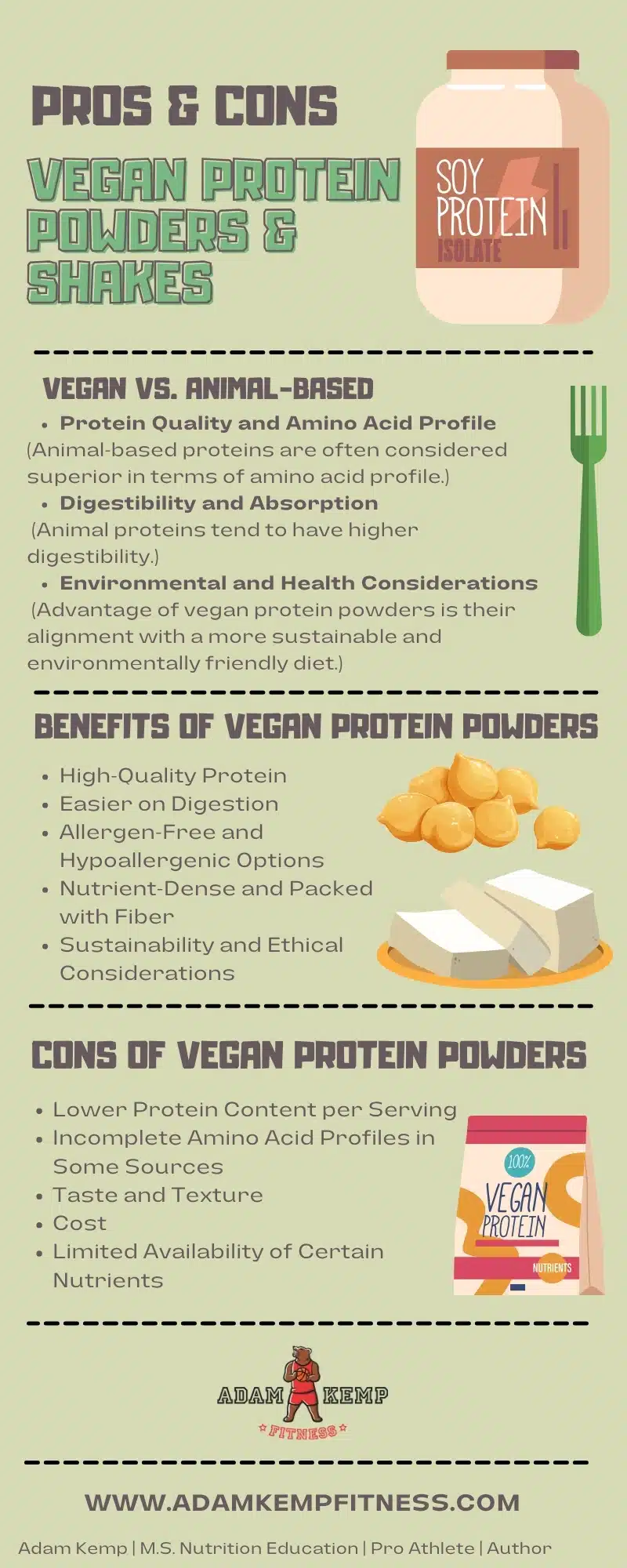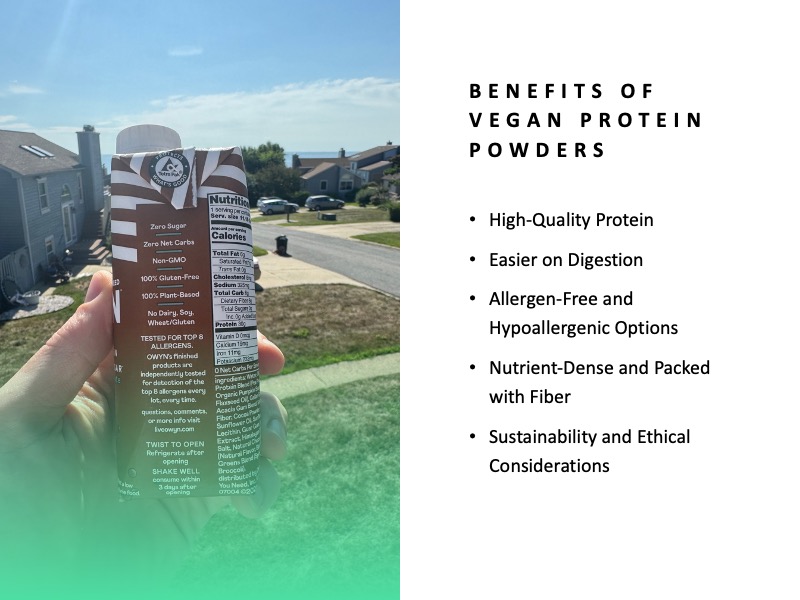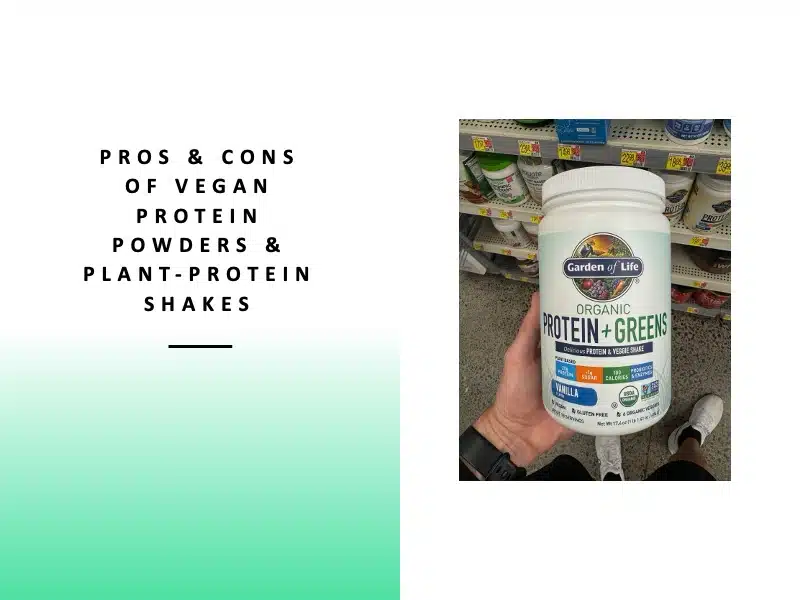Pros & Cons of Vegan Protein Powders & Plant-Protein Shakes
As a pro basketball player and nutrition educator, I choose vegan protein powders like Garden of Life because they provide a high-quality, plant-based source of protein without the common allergens and digestive issues associated with dairy.
This makes them ideal for anyone looking to fuel their workouts, enhance recovery, or build muscle while maintaining a plant-based lifestyle.
Vegan protein powders, such as Garden of Life Raw Protein & Greens, offer a range of additional benefits, including digestive enzymes, probiotics, and nutrient-dense greens, which support not only muscle growth but also overall health and digestion.
For athletes, proper protein intake is crucial, and vegan protein powders can deliver all the essential amino acids needed for muscle repair and performance, especially when combined with other plant-based foods.
As someone who has to maintain peak performance on and off the court, I find that using a product like Garden of Life Protein helps ensure that my nutrition is clean and supports my body’s demands, while also contributing to a more sustainable diet.
However, like all supplements, it’s essential to understand the pros and cons to see if they fit your individual needs and fitness goals.
In this article, we’ll analyze the pros and cons of vegan protein powders, highlighting their effectiveness, potential benefits, and any downsides to consider before incorporating them into your diet, based on both research and my professional experience.
Vegan Protein Powder vs. Animal-Based Protein Powder: Which is Better?

When it comes to building muscle, the debate between vegan and animal-based protein powders is ongoing.
While both provide the necessary protein to support muscle growth, their effectiveness can vary depending on factors such as protein quality, digestibility, and bioavailability.
Protein Quality and Amino Acid Profile
Animal-based proteins, such as whey or casein, are often considered superior in terms of amino acid profile.
They contain all nine essential amino acids in the ideal proportions for muscle synthesis, making them “complete” proteins. In contrast, many plant-based proteins, such as peas or beans, lack one or more essential amino acids or have them in lower quantities.
However, plant-based proteins can be combined—like rice and pea protein—to create a complete amino acid profile.
Despite this difference, research shows that plant-based proteins can still effectively support muscle growth.
A 2022 study published in Nutrients found that both plant and animal proteins contribute to muscle health, but due to their lower bioavailability, plant proteins may require a higher intake to match the muscle-building potential of animal proteins (Reid-McCann et al., 2022).
Digestibility and Absorption
Animal proteins tend to have higher digestibility, meaning they are absorbed more efficiently by the body.
This is reflected in their higher Protein Digestibility Corrected Amino Acid Score (PDCAAS), which measures how well a protein source is utilized by the body. Whey protein, for example, is absorbed quickly, making it a popular post-workout supplement.
Vegan protein powders, like those made from peas or hemp, may have a lower PDCAAS score, but they offer additional benefits such as being free from lactose, which can cause digestive discomfort in some individuals. Additionally, plant-based proteins are often rich in fiber, which supports digestion and overall gut health.
Environmental and Health Considerations
Another advantage of vegan protein powders is their alignment with a more sustainable and environmentally friendly diet.
Reducing animal-based protein consumption can have a lower impact on the environment, and plant-based proteins tend to be lower in saturated fats and cholesterol, supporting heart health.
While animal-based proteins may have a slight edge in terms of bioavailability and muscle-building efficiency, vegan protein powders are still an effective option when consumed in adequate amounts and combined strategically.
Benefits of Vegan Protein Powders

Vegan protein powders offer a clean, plant-based alternative to traditional supplements, with plenty of benefits for athletes and those looking to enhance their nutrition.
Vegan protein powders can be just as effective as traditional whey protein in supporting muscle growth, provided that you choose the right product and consume enough total protein each day.
Combining different plant-based protein sources, like pea and rice protein, helps ensure a complete amino acid profile, supporting muscle repair and recovery (Pohl et al., 2021).
For those aiming to build muscle on a vegetarian diet, incorporating a high-quality vegan protein powder is key. A product like Garden of Life Raw Protein & Greens is a great option due to its nutrient density, complete protein profile, and added greens, which enhance overall health and recovery.
However, it’s essential to be aware of potential downsides like lower protein content and taste challenges. By choosing high-quality products and paying attention to amino acid profiles, vegan protein powders can be an effective part of your muscle-building and recovery routine.
If you’re looking for a reliable option, Garden of Life Organic Protein and Greens remains my favorite choice for the best vegan protein powder that delivers on taste, nutrition, and performance.
High-Quality Protein
Vegan protein powders, derived from sources like pea, hemp, brown rice, and soy, provide a clean, plant-based alternative to whey or casein proteins.
Many of these vegan protein sources are complete proteins, meaning they contain all nine essential amino acids necessary for muscle repair and growth.
For example, soy and hemp proteins are complete proteins that offer all essential amino acids, making them one of the best foods for building muscle on a vegan or vegetarian diet (Teixeira et al., 2019).
Easier on Digestion
One major advantage of vegan protein powders is that they are often easier on the digestive system compared to whey protein.
Many protein shakes and meal replacement powders can cause constipation and other digestive issues because whey, a dairy-derived protein, can cause bloating, gas, and discomfort for those with lactose intolerance or sensitivity.
Vegan protein powders are naturally lactose-free, making them an ideal choice for people with digestive issues or anyone looking for a gentler alternative (Nebl et al., 2019).
Allergen-Free and Hypoallergenic Options
Vegan protein powders typically exclude common allergens like dairy, gluten, and soy (depending on the source). For those with food allergies or sensitivities, plant-based powders can offer a safer alternative to traditional protein supplements.
Additionally, products like pea protein are hypoallergenic, making them suitable for a wide range of dietary needs.
Nutrient-Dense and Packed with Fiber
Many vegan protein powders contain additional nutrients that support overall health. For example, Garden of Life Raw Protein & Greens not only provides a complete protein but also includes greens like spinach and kale for added vitamins and minerals.
Vegan protein powders are often rich in fiber, which supports digestion, promotes satiety, and aids in gut health.
This can be particularly beneficial for maintaining a lean physique and improving overall wellness (Kwiatkowska et al., 2022).
Sustainability and Ethical Considerations
Vegan protein powders are plant-based, which means they have a lower environmental impact compared to animal-derived proteins like whey or casein.
By choosing plant-based supplements, you contribute to a more sustainable food system, reducing your carbon footprint and promoting animal welfare.
Cons of Vegan Protein Powders
While vegan protein powders offer numerous health benefits and are an excellent alternative for those following plant-based diets, they do come with some potential drawbacks.
These cons are important to consider, especially for individuals focused on muscle growth or those with specific nutritional needs.
Lower Protein Content per Serving
While vegan protein powders offer quality protein, they often contain less protein per serving compared to whey or other animal-based proteins.
For those with higher protein needs, such as bodybuilders or athletes looking to build muscle on a vegetarian diet, this means you may need to consume more servings or combine protein sources to meet your daily intake goals.
Incomplete Amino Acid Profiles in Some Sources
Not all vegan protein powders are complete proteins. For instance, rice protein and pea protein may lack certain essential amino acids. To address this, many plant-based protein powders blend multiple sources (e.g., combining pea protein with rice protein) to create a complete amino acid profile.
However, this means paying attention to labels to ensure you’re getting a well-rounded product.
Taste and Texture
One of the most common complaints about vegan protein powders is the taste and texture.
While some brands have improved their formulations, many users find plant-based proteins to be grittier or have a more earthy flavor compared to their whey counterparts.
This is especially true for proteins like hemp, which can have a distinct taste that might not be for everyone.
Cost
Vegan protein powders can be more expensive than whey or other animal-based proteins, especially for higher-quality options that use organic, non-GMO ingredients.
Limited Availability of Certain Nutrients
While vegan protein powders provide high-quality protein, they may lack certain nutrients that animal-based proteins naturally offer, such as creatine, vitamin B12, and omega-3 fatty acids.
Vegan athletes may need to supplement with additional nutrients or consider fortified foods to support muscle growth and better body composition.
Best Vegan Protein Powders
Vegan protein powders offer a convenient way to meet daily protein needs, especially for those with busy lifestyles, athletes, or anyone needing an extra boost. With so many options on the market, it can be hard to choose.
From my experience, Garden of Life Raw Protein & Greens and OWYN Shakes are two of the best protein powder supplements, and specifically, two of the best vegan protein powders.
Both provide high-quality, clean, plant-based protein without artificial ingredients.
They also stand out as some of the best protein powders at Walmart, and Walmart often offers better prices on these protein shakes than you can find online.
Garden of Life Raw Protein & Greens
Garden of Life Raw Protein & Greens combines organic plant-based proteins with nutrient-dense greens to deliver 20 grams of protein per serving.
Sourced from peas, sprouted grains, and seeds, this powder also includes organic greens like spinach, alfalfa, and kale, providing a boost of vitamins, minerals, and antioxidants for overall health.
This protein powder is perfect for those who want extra digestive support, thanks to its blend of probiotics and digestive enzymes, helping improve nutrient absorption and reduce bloating.
Additionally, it is free from gluten, dairy, and soy, making it accessible to those with food sensitivities.
Garden of Life’s commitment to clean, organic ingredients with no artificial sweeteners makes it a top choice for health-conscious consumers looking for a natural way to support muscle recovery, digestion, and overall wellness.
Last update on 2025-04-26 / This article includes affiliate links/Images via Amazon Product Advertising API. I may earn commissions on purchases made through these links.
OWYN Shakes
OWYN Shakes (Only What You Need) are ready-to-drink vegan protein shakes that deliver 20 grams of protein from a blend of pea, pumpkin seed, and flaxseed.
This combination offers all nine essential amino acids, supporting muscle repair and overall health.
With the added benefits of omega-3s and prebiotic fiber, OWYN Shakes also promote heart health and gut function.
These shakes are gluten-free, soy-free, dairy-free, and contain no artificial sweeteners, making them a great option for those with allergies or dietary restrictions.
They come in delicious flavors like dark chocolate, vanilla, and cold brew coffee, providing a tasty, convenient protein option for busy lifestyles.
Last update on 2025-04-26 / This article includes affiliate links/Images via Amazon Product Advertising API. I may earn commissions on purchases made through these links.
Read Next: Plant vs Whey Protein: Is Whey or Plant Protein Better?







